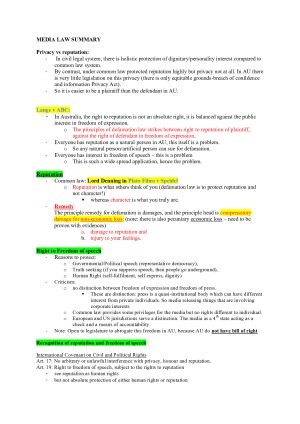Media law - LAWS3428
Subject notes for USYD LAWS3428
Description
Detailed notes covering all topics Topics: 1. The rationale and role of defamation law: balancing protection of reputation and freedom of speech: - Concept of reputation - concepts of freedom of speech 2. The tort of defamation in context: Other actions protecting reputation and other overlapping interests: - Injurious falsehood - Deceit - Conspiracy - Intimidation - Negligent mistatement - Liability under the Australian Consumer Law - Privacy and breach of confidence. 3. Defamation: Preliminary Issues - 1. History of defamation law - 2. Libel and slander - 3. Criminal defamation - 4. Who can sue for defamation?: Plaintiffs in defamation actions 4. The Plaintiff’s Case: Liability for Defamation: - 1. The elements of the cause of action for defamation - 2. Functions of judge and jury - 3. What imputations arise? Interpreting the meaning of words - 4. Reports of police activities, charges and rumours - 5. Defamatory imputations: assessing the defamatory quality of imputations - 6. Satire and parody - 7. Identification of the plaintiff - 8. Publication, repetition & republication - 9. Internet publication -10. Presumption of Damage - 11. Principle of Proportionality 5. Defences to Defamation: (i) JUSTIFICATION: - 1. Truth at common law and the defence of justification: DA s 25 - 2. NSW: Truth + (public interest or qualified privilege): DA 1974 s 15 (repealed) - 3. The Polly Peck defence -4. The defence of contextual truth: DA s 26 (ii) THE DEFENCE OF ABSOLUTE PRIVILEGE (iii) THE DEFENCE OF QUALIFIED PRIVILEGE: - 1. Components of the defence at common law, and under statute - 2. Common law qualified privilege: occasions of qualified privilege - 3. The operation of the statutory defence (DA s 30) - 4. Constitutional freedom of discussion: implied freedom of speech and comment on political and public matters (iv) THE DEFENCE OF FAIR COMMENT AND HONEST OPINION: - 1. Components of the defence of fair comment at common law and under statute - 2. Comment (and not fact), based on facts stated or indicated - 3. Matter of public interest - 4. “Fair” comment & malice (v) OTHER DEFENCES: - 1. Unintentional defamation and innocent dissemination - 2. Triviality and unlikelihood of harm - 3. Apology, retraction and offer of amends Remedies for Defamation: - 1. Injunctions - 2. Damages Privacy and Breach of Confidence: - 1. Defining privacy - 2. Indirect protection at common law? - 4. Direct protection at common law Breach of Confidence - 1. General principles - 2. Personal secrets - 3. Visual images - 4. Identity - 5. Government information - 6. Discharging an injunction - 7. The public interest defence
USYD
Semester 2, 2018
84 pages
41,913 words
$44.00
4
Campus
USYD, Camperdown/Darlington
Member since
July 2013
